To view the full series, check out our archive! As a reminder to new readers, you can start anywhere, even here as articles do not need to be read in any particular order.
This episode is Torturing Yourself: Distorted Thoughts
Rene Descartes had it right with his famous saying "I think, therefore I am."
I would like to expand his quote to "I think, therefore I become." This is certainly not a new idea. Henry Ford stated, "Whether you think you can or think you can't, you are right."
Our thoughts are powerful! Yet, despite how powerful our thoughts are, it is not unusual for us to fall into distorted thought patterns. (I also refer to this as self-torture). We try hard to remain logical most of the time, yet we fall into this trap of self-torture. I call it self-torture because, with these distorted thought patterns, we often think negative and unkind things about ourselves. It is surprising to me that we are often our worst enemy rather than our biggest ally!
Therapist John Kim LMFT discusses some of these distorted thought patterns in his article 5 Distorted Thought Patterns and How to Change Them.
Let's discuss some of the other ways we torture ourselves. See if you recognize yourself in some of the thought processes below.
- Overgeneralization- You think you aren't smart because you did not do well during an interview or, maybe you did well, but you didn't get the job. Have you ever interviewed for a job that you didn't get? It can be hard to accept rejection even if you realize that this can happen for a number of reasons, many of which may have nothing to do with you personally. Maybe they were looking for someone with a particular personality. Maybe they wanted someone with a certain skill. But the rejection leaves you feeling like you just aren't smart. This is overgeneralization. Overgeneralization is a general conclusion based on a single incident or single piece of evidence.
- Filtering- You complete a report at work. Your boss congratulates you on a job well done. However, she asks you to make one change to the report. You go home and think all night about the part you didn't get right rather than your boss' compliment that you did a good job. In filtering, you take the negative details and magnify them while filtering out of all the positive parts.
- Polarized (Black & White) Thinking: Have you ever seen an Olympic athlete sob because they received the silver medal rather than the gold medal? They consider themselves a failure in their sport because they did not get the gold. Either they are a winner (a gold medalist) or a failure (not a gold medalist). This is polarized thinking. In polarized thinking, things are either "black or white." You are either good or bad; there is no middle ground.
- Jumping to conclusions: We assume that if someone is frowning, it is because we did something wrong. Maybe the other person is in pain, is thinking about something, or just had a bad day. It may have nothing to do with us, but we jump to conclusions and assume it does. Jumping to conclusions is when we are sure we know, without an individual saying so, what they are feeling and why they are acting the way they are.
- Catastrophizing: Did you ever watch Chicken Little? Chicken Little is a story about a chicken who had an acorn hit him on the head. Chicken Little did not realize that it was an acorn that hit him and assumed that the sky was falling. This is also referred to as "magnifying or minimizing." We expect disaster to strike, no matter what. I used to refer to my husband as Chicken Little. He had a fear of losing everything and becoming destitute. We have never come close to losing a house, a car, or anything else but my husband felt this way, nevertheless. He was waiting for disaster to strike. He was catastrophizing. I am happy to report that he is much better now.
When we engage in any of these behaviors we are not thinking logically and looking at the whole picture. It is not a big deal if this is a short-term behavior. If we realize that we are engaging in distorted thought processes and change our behavior, then we are ok. The problem comes about if we do this this on a consistent basis. If you think you are a failure each time you do not excel at a task, then you eventually become what you think.
So, how does this work?
Each time you think you aren't smart, you and your subconscious start to believe it more and more. Then you start to act as if you are unintelligent. You don't sign up for a class you want to take because it will probably be too hard for you. You don't go for a promotion at work because you just aren't smart enough to do the job. Your thoughts become your belief which becomes you. In an interesting article in The Indian Journal of Psychiatry entitled The Biochemistry of Belief, it talks about how our believes become a part of us: "The biochemistry of our body stems from our awareness. Belief-reinforced awareness becomes our biochemistry. Each and every tiny cell in our body is perfectly and absolutely aware of our thoughts, feelings and of course, our beliefs....
- If you believe you are fragile, the biochemistry of your body unquestionably obeys and manifest it.
- If you believe you are tough (irrespective of your weight and bone density!), the biochemistry of your body undeniably mirrors it."
Just as they say, you are what you eat, and you are the sum of your five closest friends; you are also what you THINK!




.gif)


Comments
Post a Comment